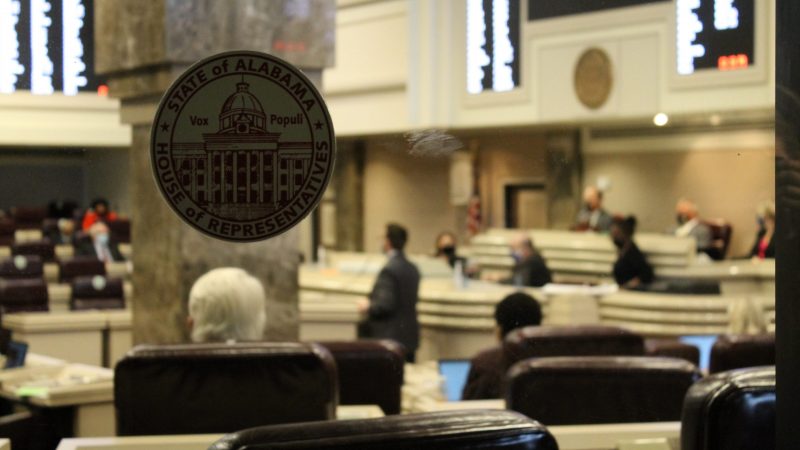Ivey calls special session on relief funds
MONTGOMERY, Ala. (AP) — Alabama Gov. Kay Ivey on Tuesday announced a midweek launch of a special session on how to use $771 million in pandemic relief funds, with lawmakers set to consider a plan to steer large sums to water and sewer projects, broadband expansion and healthcare costs.
The already anticipated special session will start Wednesday.
Legislative committees will hold a public hearing Wednesday on a draft proposal that would designate the money for spending categories such as broadband and the water and sewer projects. The bill specifies funding for previously identified high-need water and sewer projects, but largely puts state agencies in charge of deciding how to disperse the funds.
Alabama has $580 million remaining from the state’s first $1.1 billion installment from the American Rescue Plan. The state also has $191 million allocated through the America Rescue Plan’s Capital Projects Fund.
In her announcement, Ivey urged lawmakers to “direct these funds to meet some of Alabama’s biggest challenges like statewide broadband connectivity, water and sewer infrastructure, as well as investing funds in our hospitals, nursing homes and other health care providers.”
“We must be smart with these one-time, federal dollars by wisely investing -– not just casually spending them. This is not free money,” Ivey said.
The Republican governor, while calling a special session to spend the federal dollars, also criticized the Biden administration and the Congress that approved the funds.
“While states like Alabama are making record economic comebacks, Congress and the Biden White House are wanting our country to spend more and more federal dollars, and now we are tasked with allocating the American Rescue Plan Act funds. I have made clear, that unlike Washington, D.C., Alabama will be wise with these one-time federal dollars,” Ivey said.
Under the draft legislation, the state would use the $580 million to allocate: $225 million to water and sewer projects; $85 million for broadband expansion; $79 million to shore up the Unemployment Compensation Trust Fund; and about $170 million for various healthcare costs, including $80 million to reimburse hospitals and nursing homes for pandemic-related expenses and $30 million to assist rural hospitals.
The administration would get $7.8 million to reimburse the costs of reporting and auditing the use of the funds and $11 million would be used to reimburse county jails for housing state inmates during the pandemic.
A little more than half of the water and sewer funding would be used for previously identified high-need projects that will be prioritized under a ranking system created by the Alabama Department of Environmental Management. The other expenditures are not earmarked.
House Ways and Means General Fund Chairman Steve Clouse, a Republican from Ozark, said the plan addresses some of the state’s largest needs, ranging from healthcare costs to sewer infrastructure.
“We are taking care of a lot of issues, here,” Clouse said.
Clouse said an idea floated last week to use money for state parks was abandoned in favor of using more money for broadband expansion.
The state also has $191 million allocated through the America Rescue Plan’s Capital Projects Fund. The proposed legislation would put the Finance Department in charge of using the money for broadband expansion and other capital needs related to the pandemic.
Dr. Don Williamson, the president of the Alabama Hospital Association, said state hospitals took a $200 million financial hit during the pandemic because of expenses such as hiring traveling nurses to address staff shortages. Williamson said he was pleased to see efforts to allocate some money toward healthcare providers, but said they will need additional funds when the state gets the additional installment.
“We view this as a journey,” Williamson said.
A.J. McCampbell, a Democrat from Demopolis, said his priority is seeing funding for healthcare because of the financial strain that the pandemic has put on hospitals.
Rep. Chris England, a Democrat from Tuscaloosa, said he is pleased the proposal steers money to broadband expansion and water and sewer infrastructure. He added that the money has the potential to do some “real good” for the state, but criticized Alabama’s previous use of pandemic funds to build prisons.
Alabama came under criticism last year for using $400 million — nearly 20% of the state’s total $2.1 billion allocation from the American Rescue Plan — for prison construction.
“It is just a real negative reflection on priorities that we still haven’t matched up to the $400 million that we spent on prisons,” England said.
Updated 1/19/22 with quotes from lawmakers.
Pentagon shifts toward maintaining ties to Scouting
Months after NPR reported on the Pentagon's efforts to sever ties with Scouting America, efforts to maintain the partnership have new momentum
Why farmers in California are backing a giant solar farm
Many farmers have had to fallow land as a state law comes into effect limiting their access to water. There's now a push to develop some of that land… into solar farms.
Every business wants your review. What’s with the feedback frenzy?
Customers want to read reviews and businesses need reviews to attract customers. But the constant demand for reviews could be creating a feedback backlash, experts say.
‘Get back to integrity’: Oklahoma’s Kevin Stitt on Republicans after Trump
NPR's Steve Inskeep asks Oklahoma Gov. Kevin Stitt about his spat with President Trump, immigration and the future of the Republican Party.
Civil rights leaders say the racial progress Jesse Jackson fought for is under threat
Activists say racial progress won by the Rev. Jesse Jackson is under threat, as a new generation of leaders works to preserve hard-fought civil rights gains.
Tariffs cost American shoppers. They’re unlikely to get that money back
After the Supreme Court declared the emergency tariffs illegal, the refund process will be messy and will go to businesses first.






